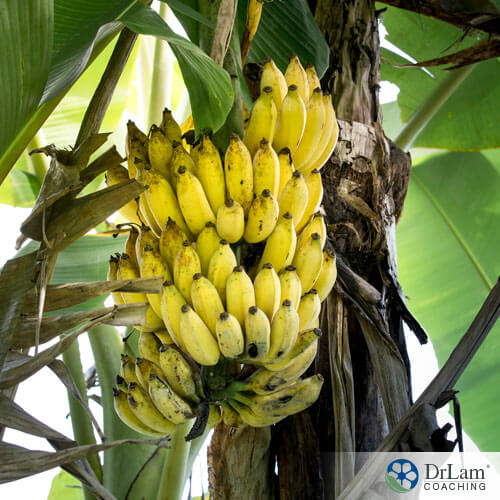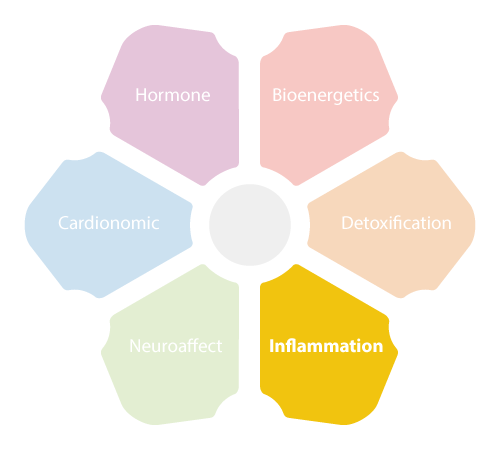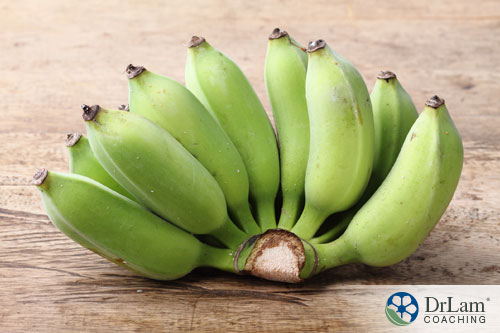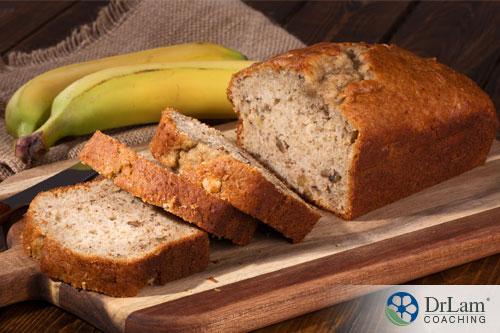 Bananas are often overlooked. Although they’re frequently eaten as a snack when you’re in a rush or added to smoothies, they don’t seem to be the type of fruit you get cravings for. But just because they’re convenient and commonplace doesn’t mean they aren’t worth learning about. You might not be aware of the many health benefits of bananas. But there are also certain risks, believe it or not. In this article, we’ll cover both—the benefits and the risks.
Bananas are often overlooked. Although they’re frequently eaten as a snack when you’re in a rush or added to smoothies, they don’t seem to be the type of fruit you get cravings for. But just because they’re convenient and commonplace doesn’t mean they aren’t worth learning about. You might not be aware of the many health benefits of bananas. But there are also certain risks, believe it or not. In this article, we’ll cover both—the benefits and the risks.
Most of us think bananas are just a regular fruit found in every household. But once upon a time, they were a new and exciting tropical delight and hardly anyone in the US knew about them. Bananas were first popularized in America in the late 1800s and early 1900s when they were brought from Costa Rica. It didn’t take long for bananas to become what they are today: a quick and nutritious snack that comes in its own natural packaging and that can give you a boost of energy when you need it.
The benefits of bananas are based on
One of the major health benefits of bananas is that they contain a lot of potassium. Interestingly, they don’t have the highest potassium content among foods, as many believe. They contain other important nutrients in higher concentrations. For example, a medium-sized banana (around 118 grams) contains:
It also contains biotin, calcium, iron, and vitamin A. Plus, around 24 grams of carbohydrates, 3.1 grams of fiber, 1.3 grams of protein, and 0.4 grams of fat.
At this point, it’s important to mention that the content of a banana actually changes as it goes through the ripening process. In fact, many of the health benefits of bananas we’ll talk about come from eating them less ripe. And some of the health risks come from eating bananas that are too ripe.
The reason is that when they’re still a little bit green, they’re essentially made up of 70–90% resistant starch—the type of starch that can’t be digested. Starch is made up of long chains of glucose, but because this type of starch is resistant to digestion, the glucose is not broken down and doesn’t end up in your bloodstream where it would spike your blood sugar levels. So, eating this type of starch can help stabilize blood sugar levels and reduce insulin resistance.
When you eat unripe bananas, resistant starch passes through your stomach and small intestine intact, making you feel full without the weight gain. When it reaches your colon, it becomes food for the healthy bacteria of your gut, thereby supporting your microbiome.
 The majority of inflammatory conditions begin in your gastrointestinal (GI) tract. This is because inflammation involves your gut, microbiome, and immune system. This triad is called the Inflammation circuit, one of six circuits that form the NeuroEndoMetabolic (NEM) Stress Response. The other five circuits are: Hormone, Bioenergetic, Neuroaffect, Cardionomic, and Detoxification.
The majority of inflammatory conditions begin in your gastrointestinal (GI) tract. This is because inflammation involves your gut, microbiome, and immune system. This triad is called the Inflammation circuit, one of six circuits that form the NeuroEndoMetabolic (NEM) Stress Response. The other five circuits are: Hormone, Bioenergetic, Neuroaffect, Cardionomic, and Detoxification.
The NEM Stress Response is your body’s global response to stress and is equipped to handle short-term stress—whether it is physical or psychological. However, chronic stress can overwork your NEM Stress Response leading to dysregulation of its various interconnected circuits. This is most clearly observed in the adrenal glands, which are part of the Hormone circuit and the first responders to stress.
Your adrenal glands secrete your body’s main anti-stress hormone, cortisol. This important hormone helps regulate blood sugar levels and blood pressure, maintains your heart and blood vessels, suppresses the immune system, and neutralizes inflammation. When your adrenals are dealing with chronic stress, cortisol output first goes up, bringing on mild symptoms. But once they become exhausted, your cortisol output drops and severe symptoms begin to manifest.
These stress-related symptoms are collectively known as Adrenal Fatigue Syndrome (AFS), including fatigue, weight gain, insomnia, mood disturbances, hair loss, infertility, premenstrual syndrome (PMS), loss of libido, hypoglycemia, food and drug sensitivities, salt and sugar cravings, frequent colds and flu, heart palpitations, and brain fog.
Higher than normal cortisol levels contribute to inflammation, whereas the absence of cortisol due to adrenal exhaustion allows inflammation to run rampant in the body, spreading from the gut to other areas. Inflammation in your joints can cause joint pain, inflammation that spreads to the nervous system may lead to anxiety and depression, and in the GI tract, digestive disorders.
So, how is all of this linked to the gut microbiome? And how can the benefits of bananas, especially when they’re still green, improve your gut health?
When the microbiome is unbalanced—in a state of dysbiosis— the lining of the gut can be compromised. Small leaks in the gut start to allow substances into the bloodstream that shouldn’t be there, such as food particles, pathogens, and toxins. As soon as the immune system detects these invaders in the blood, it launches an attack, resulting in inflammation.
If leaks continue to allow foreign substances into your bloodstream every time you eat—triggering an immune response each time—this can create a state of chronic inflammation that will continue until the leaks are sealed and the dysbiosis is addressed. Resistant starches are one way to bring balance back to the microbiome by helping to reduce your leaky gut and prevent further inflammation.
If you’re suffering from AFS, you’ll need to first need to improve your symptoms in order to reduce inflammation and promote a healthy GI tract since all the different systems of the body are connected.
We’ve just seen how resistant starch, which acts in a similar way to soluble fiber, is one of the major health benefits of bananas. Especially, if you eat them while they’re still green. But what about the vitamins and minerals in bananas? They also play an important role in adrenal fatigue recovery. So, let’s take a closer look.
 Although vitamins B5 and B12 are the most important B-complex vitamins for Adrenal Fatigue recovery, the entire range of B vitamins are needed because B vitamins support each other. Bananas contain 33% of your RDI of vitamin B6, which means that if you’re regularly eating a balanced diet that includes bananas, you may not need a B complex supplement. Most people only require a B12 supplement. But, if you’re nutritionally deficient, a B complex formula with 60–120 mg of B3, 50–100 mg of B6, and 100–300 mcg of B12 can help support your AFS recovery.
Although vitamins B5 and B12 are the most important B-complex vitamins for Adrenal Fatigue recovery, the entire range of B vitamins are needed because B vitamins support each other. Bananas contain 33% of your RDI of vitamin B6, which means that if you’re regularly eating a balanced diet that includes bananas, you may not need a B complex supplement. Most people only require a B12 supplement. But, if you’re nutritionally deficient, a B complex formula with 60–120 mg of B3, 50–100 mg of B6, and 100–300 mcg of B12 can help support your AFS recovery.
One of the most important vitamins in Adrenal Fatigue recovery is vitamin C. In fact, the adrenal glands have one of the highest concentrations of vitamin C in the body. That’s why vitamin C deficiency is one of the most prevalent deficiencies in AFS and lowered immunity is a symptom of AFS. Vitamin C can boost the immune system and reduce infections and inflammation. In general, vitamin C supplements are necessary for AFS recovery. But it’s just as important to get enough vitamin C through your diet, and one banana can provide a little over one-tenth of the RDI. However, too much vitamin C can backfire and cause more harm than good depending on what stage of Adrenal Fatigue you’re in. Therefore, it’s important to seek advice from an Adrenal Fatigue specialist who can help guide you through the recovery process.
Potassium and magnesium are also important benefits of bananas. Both minerals support the cardiovascular system. You need to be extra careful with potassium if you’re dealing with Adrenal Fatigue, but we’ll cover this in the next section. Generally speaking, potassium and magnesium are not just good for the heart, they’re essential. Magnesium, in particular, is incredibly important for AFS recovery since it’s crucial for using the ATP—the energy currency of life—produced by mitochondria inside all of your cells.
Adrenal Fatigue is characterized by a general lack of energy, which brings on fatigue and slows down many of your body’s functions, including reproduction (low libido and fertility issues are associated with AFS) and detoxification. This intelligent adaptation is attempting to conserve the little energy your body has left. But it can be hugely damaging to your health and make daily life extremely challenging.
Replenishing your energy stores by eating nutritious foods will provide your body with the building blocks it needs to create more energy and is, therefore, an essential step in your AFS recovery. If eaten properly, bananas can be part of this process.
Once they begin to ripen, the health benefits of bananas start to change. For one, resistant starch turns into sugar. When dealing with any kind of metabolic derangement, especially Adrenal Fatigue, sugar is something you need to be careful with.
Glucose is vital for producing energy and is the primary fuel for your brain. But when it enters your bloodstream too quickly, it will cause a spike your blood sugar levels. When that happens, your pancreas has to secrete a lot more insulin—the hormone responsible for taking the sugar from the blood and helping it reach your cells where it’s converted into energy—to deal with the excess glucose.
A sudden surge of insulin causes your blood sugar levels to drop rapidly, bringing on hypoglycemia. Symptoms of hypoglycemia include shakiness, dizziness, sweating, heart palpitations, lightheadedness, hunger, irritability, and sugar cravings. The sugar craving is actually part of your survival mechanism, which pushes you to consume sugar so that you won’t faint or slip into a coma, a possibility with severe hypoglycemia. Remember, glucose is your brain’s primary source of fuel.
However, sugar causes your blood sugar levels to spike, setting off the cycle of spikes and crashes yet again. This is extremely stressful on your body and on your adrenal glands. Your adrenals secrete cortisol, which, in turn, increases blood sugar levels. But if this occurs several times a day, your adrenals will become overwhelmed. This cycle can also cause inflammation and aggravate any inflammation already present in your body.
That’s why you need to be careful about eating certain fruits, including bananas, that have a high sugar content.
As we also mentioned, it’s important to be careful with foods high in potassium. Although this is one of the health benefits of bananas, the benefit turns into risk when dealing with AFS. With AFS, the sodium-potassium ratio is usually out of balance owing to hormonal fluctuations.
In general, if you suffer from AFS, your system has too much potassium and too little sodium, even if your blood test values are normal. That’s why we sometimes recommend adding a pinch of salt (sodium) to your drinking water to improve this ratio. It’s also best to avoid potassium-rich foods like bananas, oranges, dates, figs, and raisins, which can trigger adrenal crashes.
 So, what should you do? Eat bananas or avoid them altogether? Well, that really depends on which stage of AFS you’re in. If you’re in the more advanced stages, you may want to avoid them until your adrenals are a little stronger. On the other hand, if you’re still in earlier stages, you can enjoy the health benefits of bananas by including them in your diet, but only in moderation.
So, what should you do? Eat bananas or avoid them altogether? Well, that really depends on which stage of AFS you’re in. If you’re in the more advanced stages, you may want to avoid them until your adrenals are a little stronger. On the other hand, if you’re still in earlier stages, you can enjoy the health benefits of bananas by including them in your diet, but only in moderation.
You can boil or soak bananas before eating them to leach out excess potassium. Try adding them to a recipe like our AFS-friendly banana bread. We also have a recipe for fermented bananas, that combines the benefits of gut-healthy fermentation with the health benefits of bananas.
In the end, what matters is that you do what is right for your current condition and health goals. When in doubt, seek the guidance of a health professional experienced in AFS and nutrition.
© Copyright 2020 Michael Lam, M.D. All Rights Reserved.
It’s the fruit you possibly eat most often, but is it always a healthy choice? The truth is that the benefits of bananas generally outweigh the risks, except in rare cases. The nutrients and fiber in this snack can add a lot of value to your diet.
